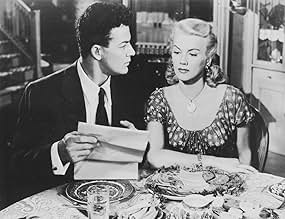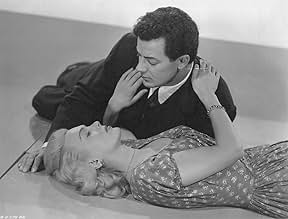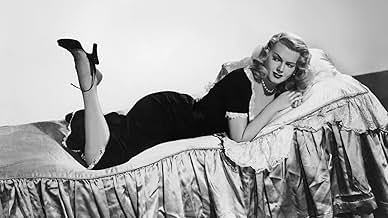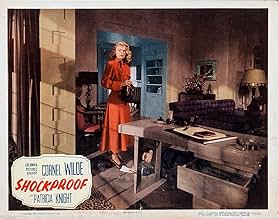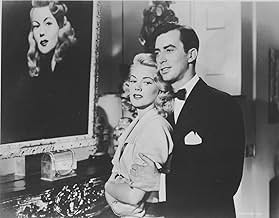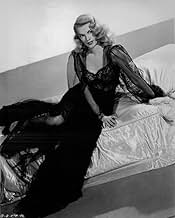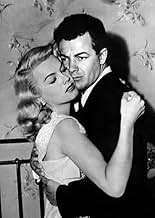NOTE IMDb
6,5/10
2,7 k
MA NOTE
Un agent de libération conditionnelle tombe amoureux de sa cliente, une ravissante blonde qui a purgé une peine pour meurtre, et il est déterminé à l'aider à rentrer dans le droit chemin mal... Tout lireUn agent de libération conditionnelle tombe amoureux de sa cliente, une ravissante blonde qui a purgé une peine pour meurtre, et il est déterminé à l'aider à rentrer dans le droit chemin malgré l'intervention de son petit ami criminel.Un agent de libération conditionnelle tombe amoureux de sa cliente, une ravissante blonde qui a purgé une peine pour meurtre, et il est déterminé à l'aider à rentrer dans le droit chemin malgré l'intervention de son petit ami criminel.
- Réalisation
- Scénario
- Casting principal
Shirley Adams
- Emmy
- (non crédité)
Gilbert Barnett
- Barry
- (non crédité)
Richard Benedict
- 'Kid' - Knife Wielder
- (non crédité)
Paul Bradley
- Airline Clerk
- (non crédité)
Argentina Brunetti
- Stella
- (non crédité)
Paul Bryar
- Man in Car
- (non crédité)
John Butler
- Sam Green, Pawnbroker
- (non crédité)
Claire Carleton
- Florrie Kobiski
- (non crédité)
Cliff Clark
- Mac - Police Lieutenant
- (non crédité)
King Donovan
- Joe Wilson
- (non crédité)
Al Eben
- Joe Kobiski
- (non crédité)
Avis à la une
"Shockproof" is a 1949 Douglas Sirk film starring Cornel Wilde and Patricia Knight. Wilde is Griff Marat, who gets a paroled prisoner, Jenny Marsh (Knight) on his caseload. She refuses to give up the bad acquaintances that got her into trouble in the first place; this includes her old boyfriend, Harry (John Baragrey) whom she continues to meet secretly. Griff has taken Jenny into his home to care for his blind mother (Esther Minciotti), and over time, they fall in love. Though she's still pulled toward Harry, she balks when Harry wants her to convince Griff to marry her, a clear violation of his job ethics and her parole. Because Griff has political ambitions, they will then have them where they want him. Gradually Harry realizes that Jenny is not going to cooperate, and he ends up gravely injured. Griff and Jenny go on the run to avoid her arrest.
This is a pretty good noir with two heavyweights attached, Sirk, the director, and Sam Fuller, who co-wrote the script. Unfortunately, the characters aren't fleshed out enough so that we understand their sudden turnarounds - a man on the side of the law with political ambitions decides to throw it all out the window, marry a client secretly, and go on the run riding in boxcars and living in shacks because though the shooting was accidental, Griff feels Jenny won't be believed. That's just Griff - in reality, all three of the main characters do complete reversals during the course of this film with little or no justification.
Wilde does a good job here, and Knight, a new actress to me, is beautiful and has good chemistry opposite her then husband Wilde. She didn't work much longer, as after their divorce, her career dried up.
Entertaining.
This is a pretty good noir with two heavyweights attached, Sirk, the director, and Sam Fuller, who co-wrote the script. Unfortunately, the characters aren't fleshed out enough so that we understand their sudden turnarounds - a man on the side of the law with political ambitions decides to throw it all out the window, marry a client secretly, and go on the run riding in boxcars and living in shacks because though the shooting was accidental, Griff feels Jenny won't be believed. That's just Griff - in reality, all three of the main characters do complete reversals during the course of this film with little or no justification.
Wilde does a good job here, and Knight, a new actress to me, is beautiful and has good chemistry opposite her then husband Wilde. She didn't work much longer, as after their divorce, her career dried up.
Entertaining.
It's difficult to believe, but even by this Early Date of 1949 the Cynicism and Doom Laden Tropes of Film-Noir were becoming unacceptable for the Safe and Conservative Studio Heads. Sam Fuller's Script was stripped of its edginess and coated with a sweetness Ending. Neither Fuller nor Director Douglas Sirk were pleased and voiced Their disapproval loudly.
But the Power of Low-Rung, untested Writers and Directors was Minimal. So what remains is a Soapy Triangle with enough Artistic Insight to be passable and somewhat enjoyable, but hardly Pure Film-Noir and the impact is diluted and disappointing.
Cornel Wilde as the Parole Officer and Patricia Knight have and unexpected collision of Love's vice like grip and its ability to change People drastically. John Barangay as the Ex-Lover is Bland and really doesn't do much to attract audiences to His vile villainy but is good enough.
Wilde, not the best Actor in the World does have a Physical Presence and was Drop Dead Handsome. Knight was as Stiff as They Come and had a limited Career and tries mightily here but was betrayed by Her Talent and got by on Her slightly Off-Beat Beauty.
Overall, Worth a Watch for Sirk and Fuller, but must be Footnoted as mishandled by Studio Interference. Film-Noir Fans and Fuller Cultists might be disappointed. A Film-Noir only in a Wide Definition of the Genre.
But the Power of Low-Rung, untested Writers and Directors was Minimal. So what remains is a Soapy Triangle with enough Artistic Insight to be passable and somewhat enjoyable, but hardly Pure Film-Noir and the impact is diluted and disappointing.
Cornel Wilde as the Parole Officer and Patricia Knight have and unexpected collision of Love's vice like grip and its ability to change People drastically. John Barangay as the Ex-Lover is Bland and really doesn't do much to attract audiences to His vile villainy but is good enough.
Wilde, not the best Actor in the World does have a Physical Presence and was Drop Dead Handsome. Knight was as Stiff as They Come and had a limited Career and tries mightily here but was betrayed by Her Talent and got by on Her slightly Off-Beat Beauty.
Overall, Worth a Watch for Sirk and Fuller, but must be Footnoted as mishandled by Studio Interference. Film-Noir Fans and Fuller Cultists might be disappointed. A Film-Noir only in a Wide Definition of the Genre.
Patricia Knight has just been paroled. Her parole officer is Cornell Wilde. He reads off the list of restrictions which she has already memorized. She almost immediately breaks them when she sees her former lover, gambler John Baragrey in a bookie shop, but Wilde gives her another chance. She loses her job, so her takes her into his home to take care of his blind mother. Soon they are in love. She goes to Baragrey's apartment to tell him goodbye. He calls Wilde at the office to tell him she's breaking parole and playing him for a sucker, so she shoots him. And she and Wilde go on the run.
Douglas Sirk directs with lots of fine location shooting, including the essential-for-noir Bradbury Building. He agreed to shoot this one after reading Samuel Fuller's original story, even though Columbia put in a cop-out ending that frustrated Wilde's character arc, from a straight-arrow fellow with political ambition to a criminal on the run. His real-life wife, Patricia Knight, gives a fine, guarded performance; you never know what she's really thinking or going to do next. Her movie career did not survive her divorce from Wilde. She died in 2004, age 89.
Douglas Sirk directs with lots of fine location shooting, including the essential-for-noir Bradbury Building. He agreed to shoot this one after reading Samuel Fuller's original story, even though Columbia put in a cop-out ending that frustrated Wilde's character arc, from a straight-arrow fellow with political ambition to a criminal on the run. His real-life wife, Patricia Knight, gives a fine, guarded performance; you never know what she's really thinking or going to do next. Her movie career did not survive her divorce from Wilde. She died in 2004, age 89.
They say it's the journey, not the destination, that usually counts with stories. In the case of Shockproof it's good to just focus on the journey, in all its B-movie-ness and, yes since it is Douglas Sirk, melodrama, because the destination kind of stinks. The film's story concerns a beautiful blonde parolee played by Patricia Knight who is put into the watchful eye and soon enough loving arms of her parole officer, Cornell Wilde. She's been wanting to get back together with her former lover, a gambler-hustler named Harry Wesson, who by the look of the guy is sleazy but perhaps not too bad a shake for a 'dame' like Knight plays. But the parole officer wants a better life for her, and that she knows it too. Soon she does, after some persistence, fall for Griff, but at a price when another character gets (preumably) murdered after a gunshot.
It becomes a lovers-on-the-run story, and, not to quote Harry's own line about the melodrama I mention above, this twist does bring some melodrama with it as the characters try to evade the law, cross into Mexico, go back into the states and Griff becomes an oil-drill worker. But the main problem of being on the lam catches up to them, and finally a decision is made. It's around here, in just the last few minutes, that the film really crumbles into predictability (and, to be fair, it wasn't Fuller's idea as the producer rewrote the script before filming). The acting and the script up until that point, however, does deliver on the promise of a simple premise. There's nothing terribly special about the story, but it works on its own terms as a tale of a love-triangle gone awry. We know the situation might be different if a character did something smarter, or did something more drastic or if, say, Harry went more into an actual criminal role and just ran off with Jenny to start with after she got out of prison.
But as it stands the performances are just fine- even the one-note crooning of the blind mother of Griff's who knows what she knows even without seeing, a real Fuller caricature if I ever saw one- and when it comes off like a real film-noir, with edge and believability, both of the legends Sirk and Fuller can get credit. It's no great shakes, but it passes 80 minutes by with some rich emotions and a, with a few exceptions in some scenes, solid dramatic turns and directions made by the characters.
It becomes a lovers-on-the-run story, and, not to quote Harry's own line about the melodrama I mention above, this twist does bring some melodrama with it as the characters try to evade the law, cross into Mexico, go back into the states and Griff becomes an oil-drill worker. But the main problem of being on the lam catches up to them, and finally a decision is made. It's around here, in just the last few minutes, that the film really crumbles into predictability (and, to be fair, it wasn't Fuller's idea as the producer rewrote the script before filming). The acting and the script up until that point, however, does deliver on the promise of a simple premise. There's nothing terribly special about the story, but it works on its own terms as a tale of a love-triangle gone awry. We know the situation might be different if a character did something smarter, or did something more drastic or if, say, Harry went more into an actual criminal role and just ran off with Jenny to start with after she got out of prison.
But as it stands the performances are just fine- even the one-note crooning of the blind mother of Griff's who knows what she knows even without seeing, a real Fuller caricature if I ever saw one- and when it comes off like a real film-noir, with edge and believability, both of the legends Sirk and Fuller can get credit. It's no great shakes, but it passes 80 minutes by with some rich emotions and a, with a few exceptions in some scenes, solid dramatic turns and directions made by the characters.
Real life husband and wife Cornel Wilde and Patricia Knight star as parole officer / parolee in this quasi noirish post-war drama. Wilde, who is assigned as Knight's parole officer, insists that as a condition of her parole she no longer associate with her former boyfriend, unsavory gambler (John Baragrey). Wilde who is smitten almost immediately by Knight, begins to bend the rules as Knight ignores the conditions of her parole and continues to see Baragrey. Because of her parole violations, Wilde being a concerned officer of the court, suggests Knight move into his home that he shares with his blind, widowed mother and younger brother. The situation continues on a downward trend.
Written by hard edged, cigar chomping, World War II vet Samuel Fuller and directed by melodrama master Douglas Sirk, this movie is a contrast of styles between writer and director. In this case the director Sirk called the shots. With the assist of a script revision from Helen Deutsch (I'll Cry Tomorrow, Valley of the Dolls), Sirk plays it out more as a tortured romantic triangle with dribs and drabs of writer Fuller's permeating cynicism occasionally popping through.
Despite a title suggesting more lurid content, 'Shockproof' offers little to actually be shocked by, probably because of the lack of any real criminal intent by the characters beyond parole violations. What tension this movie engenders is more human conflict from the soap opera style re-draft by Deutsch. With a script basically hollowed from Fuller's fatalistic influence, what's left is a sort of a well-crafted but tepid potboiler complete with a contrived populist ending.
'Shockproof' isn't a bad movie just more of a disappointment of what could have been.
Written by hard edged, cigar chomping, World War II vet Samuel Fuller and directed by melodrama master Douglas Sirk, this movie is a contrast of styles between writer and director. In this case the director Sirk called the shots. With the assist of a script revision from Helen Deutsch (I'll Cry Tomorrow, Valley of the Dolls), Sirk plays it out more as a tortured romantic triangle with dribs and drabs of writer Fuller's permeating cynicism occasionally popping through.
Despite a title suggesting more lurid content, 'Shockproof' offers little to actually be shocked by, probably because of the lack of any real criminal intent by the characters beyond parole violations. What tension this movie engenders is more human conflict from the soap opera style re-draft by Deutsch. With a script basically hollowed from Fuller's fatalistic influence, what's left is a sort of a well-crafted but tepid potboiler complete with a contrived populist ending.
'Shockproof' isn't a bad movie just more of a disappointment of what could have been.
Le saviez-vous
- AnecdotesThis film features the iconic Bradbury Building at 304 S. Broadway as the location of Griff Marat's office. Out of his office window can be seen the old Hall of Records Building at 220 N. Broadway (demolished 1973), which is about 0.4 miles away.
- GaffesWhen Sam Brooks comes into Griff's office, he leaves the door open. After he reads the folder and leaves the door is closed without him ever closing it.
- Citations
Jenny Marsh: I'm no longer asking you to say goodbye. I'm just saying it!
- Crédits fousFollowing the opening credits the camera pans onto the curb edge of the road which reads HOLLYWOOD BLVD.
- ConnexionsFeatured in Behind the Mirror: A Profile of Douglas Sirk (1979)
Meilleurs choix
Connectez-vous pour évaluer et suivre la liste de favoris afin de recevoir des recommandations personnalisées
- How long is Shockproof?Alimenté par Alexa
Détails
- Date de sortie
- Pays d’origine
- Langues
- Aussi connu sous le nom de
- Los amantes
- Lieux de tournage
- Société de production
- Voir plus de crédits d'entreprise sur IMDbPro
- Durée1 heure 19 minutes
- Couleur
- Rapport de forme
- 1.37 : 1
Contribuer à cette page
Suggérer une modification ou ajouter du contenu manquant

Lacune principale
By what name was Jenny, femme marquée (1949) officially released in India in English?
Répondre
